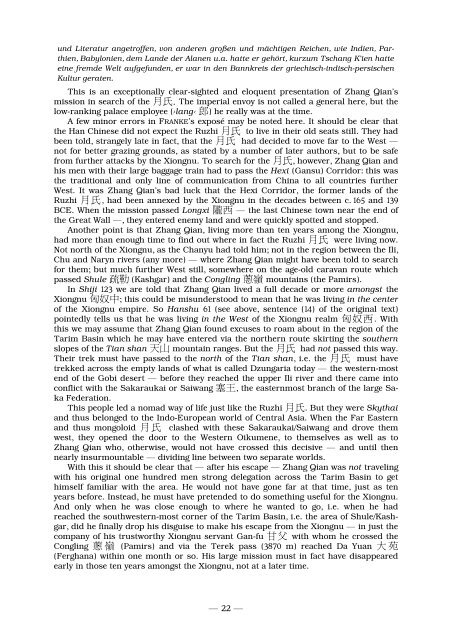張騫 Zhang Qian. The Secret Envoy of Han Emperor Wu in Search of the Arsi (Yuezhi) and the Fall of the Græco-Bactrian Kingdom. (Annotated Compilation of Eastern and Western Sources)
The study undertakes: — to clarify in what year Zhang Qian reached the Oxus river; to establish that the Daxia 大夏 in Shiji 123 represent the Tachar/Tochar of Tochar-i-stan; to explain how we are to understand the "List of Four" in Strabon 11.8.2.
The study undertakes: —
to clarify in what year Zhang Qian reached the Oxus river;
to establish that the Daxia 大夏 in Shiji 123 represent the Tachar/Tochar of Tochar-i-stan;
to explain how we are to understand the "List of Four" in Strabon 11.8.2.
Create successful ePaper yourself
Turn your PDF publications into a flip-book with our unique Google optimized e-Paper software.
und Literatur angetr<strong>of</strong>fen, von <strong>and</strong>eren großen und mächtigen Reichen, wie Indien, Parthien,<br />
Babylonien, dem L<strong>and</strong>e der Alanen u.a. hatte er gehört, kurzum Tschang K’ien hatte<br />
e<strong>in</strong>e fremde Welt aufgefunden, er war <strong>in</strong> den Bannkreis der griechisch-<strong>in</strong>disch-persischen<br />
Kultur geraten.<br />
This is an exceptionally clear-sighted <strong>and</strong> eloquent presentation <strong>of</strong> <strong>Zhang</strong> <strong>Qian</strong>’s<br />
mission <strong>in</strong> search <strong>of</strong> <strong>the</strong> 月 氏 . <strong>The</strong> imperial envoy is not called a general here, but <strong>the</strong><br />
low-rank<strong>in</strong>g palace employee (›lang‹ 郎 ) he really was at <strong>the</strong> time.<br />
A few m<strong>in</strong>or errors <strong>in</strong> FRANKE’s exposé may be noted here. It should be clear that<br />
<strong>the</strong> <strong>Han</strong> Ch<strong>in</strong>ese did not expect <strong>the</strong> Ruzhi 月 氏 to live <strong>in</strong> <strong>the</strong>ir old seats still. <strong>The</strong>y had<br />
been told, strangely late <strong>in</strong> fact, that <strong>the</strong> 月 氏 had decided to move far to <strong>the</strong> West —<br />
not for better graz<strong>in</strong>g grounds, as stated by a number <strong>of</strong> later authors, but to be safe<br />
from fur<strong>the</strong>r attacks by <strong>the</strong> Xiongnu. To search for <strong>the</strong> 月 氏 , however, <strong>Zhang</strong> <strong>Qian</strong> <strong>and</strong><br />
his men with <strong>the</strong>ir large baggage tra<strong>in</strong> had to pass <strong>the</strong> Hexi (Gansu) Corridor: this was<br />
<strong>the</strong> traditional <strong>and</strong> only l<strong>in</strong>e <strong>of</strong> communication from Ch<strong>in</strong>a to all countries fur<strong>the</strong>r<br />
West. It was <strong>Zhang</strong> <strong>Qian</strong>’s bad luck that <strong>the</strong> Hexi Corridor, <strong>the</strong> former l<strong>and</strong>s <strong>of</strong> <strong>the</strong><br />
Ru zhi 月 氏 , had been annexed by <strong>the</strong> Xiongnu <strong>in</strong> <strong>the</strong> decades between c. 165 <strong>and</strong> 139<br />
BCE. Wh en <strong>the</strong> mission passed Longxi 隴 西 — <strong>the</strong> last Ch<strong>in</strong>ese town near <strong>the</strong> end <strong>of</strong><br />
<strong>the</strong> Great Wall —, <strong>the</strong>y entered enemy l<strong>and</strong> <strong>and</strong> were quickly spotted <strong>and</strong> stopped.<br />
Ano<strong>the</strong>r po<strong>in</strong>t is that <strong>Zhang</strong> <strong>Qian</strong>, liv<strong>in</strong>g more than ten years among <strong>the</strong> Xiongnu,<br />
had more than enough time to f<strong>in</strong>d out where <strong>in</strong> fact <strong>the</strong> Ruzhi 月 氏 were liv<strong>in</strong>g now.<br />
N ot north <strong>of</strong> <strong>the</strong> Xiongnu, as <strong>the</strong> Chanyu had told him; not <strong>in</strong> <strong>the</strong> region between <strong>the</strong> Ili,<br />
C hu <strong>and</strong> Naryn rivers (any more) — where <strong>Zhang</strong> <strong>Qian</strong> might have been told to search<br />
for <strong>the</strong>m; but much fur<strong>the</strong>r West still, somewhere on <strong>the</strong> age-old caravan route which<br />
passed Shule 疏 勒 (Kashgar) <strong>and</strong> <strong>the</strong> Congl<strong>in</strong>g 蔥 嶺 mounta<strong>in</strong>s (<strong>the</strong> Pamirs).<br />
In Shiji 123 we are told that <strong>Zhang</strong> <strong>Qian</strong> lived a full decade or more amongst <strong>the</strong><br />
X iongnu 匈 奴 中 ; this could be misunderstood to mean that he was liv<strong>in</strong>g <strong>in</strong> <strong>the</strong> center<br />
o f <strong>the</strong> Xiongnu empire. So <strong>Han</strong>shu 61 (see above, sentence (14) <strong>of</strong> <strong>the</strong> orig<strong>in</strong>al text)<br />
po<strong>in</strong>tedly tells us that he was liv<strong>in</strong>g <strong>in</strong> <strong>the</strong> West <strong>of</strong> <strong>the</strong> Xiongnu realm 匈 奴 西 . With<br />
t his we may assume that <strong>Zhang</strong> <strong>Qian</strong> found excuses to roam about <strong>in</strong> <strong>the</strong> region <strong>of</strong> <strong>the</strong><br />
Tarim Bas<strong>in</strong> which he may have entered via <strong>the</strong> nor<strong>the</strong>rn route skirt<strong>in</strong>g <strong>the</strong> sou<strong>the</strong>rn<br />
slopes <strong>of</strong> <strong>the</strong> Tian shan 天 山 mounta<strong>in</strong> ranges. But <strong>the</strong> 月 氏 had not passed this way.<br />
<strong>The</strong>ir trek must have passed to <strong>the</strong> north <strong>of</strong> <strong>the</strong> Tian shan, i.e. <strong>the</strong> 月 氏 must have<br />
trekked across <strong>the</strong> empty l<strong>and</strong>s <strong>of</strong> what is called Dzungaria today — <strong>the</strong> western-most<br />
end <strong>of</strong> <strong>the</strong> Gobi desert — before <strong>the</strong>y reached <strong>the</strong> upper Ili river <strong>and</strong> <strong>the</strong>re came <strong>in</strong>to<br />
conflict with <strong>the</strong> Sakaraukai or Saiwang 塞 王 , <strong>the</strong> easternmost branch <strong>of</strong> <strong>the</strong> large Sa-<br />
ka Federation.<br />
This people led a nomad way <strong>of</strong> life just like <strong>the</strong> Ruzhi 月 氏 . But <strong>the</strong>y were Skythai<br />
<strong>and</strong> thus belonged to <strong>the</strong> Indo-European world <strong>of</strong> Central Asia. When <strong>the</strong> Far <strong>Eastern</strong><br />
<strong>and</strong> thus mongoloid 月 氏 clashed with <strong>the</strong>se Sakaraukai/Saiwang <strong>and</strong> drove <strong>the</strong>m<br />
w est, <strong>the</strong>y opened <strong>the</strong> door to <strong>the</strong> <strong>Western</strong> Oikumene, to <strong>the</strong>mselves as well as to<br />
Z hang <strong>Qian</strong> who, o<strong>the</strong>rwise, would not have crossed this decisive — <strong>and</strong> until <strong>the</strong>n<br />
nearly <strong>in</strong>surmountable — divid<strong>in</strong>g l<strong>in</strong>e between two separate worlds.<br />
With this it should be clear that — after his escape — <strong>Zhang</strong> <strong>Qian</strong> was not travel<strong>in</strong>g<br />
with his orig<strong>in</strong>al one hundred men strong delegation across <strong>the</strong> Tarim Bas<strong>in</strong> to get<br />
himself familiar with <strong>the</strong> area. He would not have gone far at that time, just as ten<br />
years before. Instead, he must have pretended to do someth<strong>in</strong>g useful for <strong>the</strong> Xiongnu.<br />
And only when he was close enough to where he wanted to go, i.e. when he had<br />
reached <strong>the</strong> southwestern-most corner <strong>of</strong> <strong>the</strong> Tarim Bas<strong>in</strong>, i.e. <strong>the</strong> area <strong>of</strong> Shule/Kashar,<br />
did he f<strong>in</strong>ally drop his disguise to make his escape from <strong>the</strong> Xiongnu — <strong>in</strong> just <strong>the</strong><br />
g<br />
c ompany <strong>of</strong> his trustworthy Xiongnu servant Gan-fu 甘 父 with whom he crossed <strong>the</strong><br />
Congl<strong>in</strong>g 蔥 嶺 (Pamirs) <strong>and</strong> via <strong>the</strong> Terek pass (3870 m) reached Da Yuan 大 苑<br />
( Ferghana) with<strong>in</strong> one month or so. His large mission must <strong>in</strong> fact have disappeared<br />
early <strong>in</strong> those ten years amongst <strong>the</strong> Xiongnu, not at a later time.<br />
— 22 —


